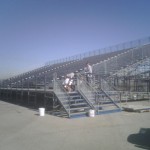Author: FormulaD
Formula DRIFT x Autofiends.com SEMA Party
Formula DRIFT teamed up with Autofiends.com to throw one amazing party at TAO during SEMA. Presenting sponsor of the event was Capital Forged wheels.
Mixing it up on the decks were DJ’s Fashen, Tina T, and Steve Aoki! UFC fighter Rampage Jackson made a special appearance as well. Another year and another great party.
More Photos after the jump! Enjoy.
Formula DRIFT SEMA Coverage
Red Bull Build cont….
It has begun…
Red Bull Drifting World Championship build began on Tuesday. Here are some pics…
More to come. Grandstands going up right now
























